Poetry is very important to me. I like to write as regularly as possible. It's not always practical to do so but ideally I'd like to write every day. Recently, writing poetry has given way to other activities, but I hope now to return to it in a meaningful way! The following poems are all mine - please click here for an Anthology page I've started for the work of other poets.
POEMS BELOW:
Bright Fish
March Morning
Jeremy
Sophie
Scala
Holiday at Erddig
At Morning Prayers we sit cross-legged
Thin
Aachen at Advent
Crime & Punishment
Bob's Been Done
The sign above the tank reads: Marine fish are very delicate and
extremely sensitive to knocks, chemicals and touch. Can they
bear then the low buzzing drone of the pump, the water
endlessly gurgling through green plastic pipes, crusted with salt?
Two of them swim to greet me, I wave and smile at them, their
tangerine torsos, black-ringed eyes, soot-fringed tails and fins,
white stripes under chins, tiny Jacob Marleys.
Silvered bubbles cluster on the sandy grit bottom, clouds
of verdant algae, and a tower of rock in the corner,
Miss Haversham’s underwater wedding cake; a
dark grey shell streaked with white, as if seagulls’ droppings
have penetrated this inner sea.
Bright micro-Triffids sway, green candy-floss sea-snails
sucker up against the front pane, red and brown cats’ tails
hang from the thermometer, caught and nipped by the fish.
On a purple and grey outcrop a Hermit crab sports a dark red
Quentin Crisp beehive, six Japanese-lacquered legs and two miniature
digits busy in an invisible typing-pool while
its wide front claws scrape at dots of food and sweep them into its mouth.
March morning
A line of green and blue washing which
I nipped out to hang when I woke
to the sound of strong gusts
battering the wind-chimes
Pegged shirts bellying out, sleeves like invisible men
possessed by a Mexican wave, above them
dark grey clouds rushing eastwards in
light, bright blue
An airliner approaches, from America perhaps,
Roger Vignoles tickles the ivories on Radio 3,
and the kettle boils for a small white pot of tea
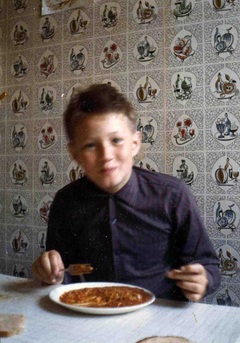
Like a large friendly bear, in your camel coat;
I’m remembering your pleased face at the
window, as you pulled the curtains, and looked up
to see us coming down the path;
and your shivers in the draught from the open front window
at 56, how we moved to another table
and you hugged the radiator, smiling
at the Irish waitress to re-assure her that though
your face was grey and bathed in sweat, you
needed no fussing, and you
ordered the roast lamb with all the trimmings.
The day we sat, the others gone shopping,
watching the golf and the Formula One;
you knew I hated sport, that our companionable silence,
with no demand for false cheer or
wearing conversation was my offering of love
and accepting it was your gift to me;
once a petulant little sister, taunting you with unkind names,
searching for the key to twist your hurt into rage,
scoring points in our endless struggle for Mum’s attention.
You didn’t lose your ways, even to the end:
your forthright views, your
abundant use of the F word, your love of food.
It seemed you were finding yourself, and
through these new pains coming to a place
where old hurts were healing, unexpectedly.
We brought you trifle, raspberry jellies, chocolate mousse,
tropical fruit, and the last time we saw you conscious,
Kent strawberries (“F ---ing gorgeous”) and a tub
of Carluccio’s ice-cream, which you ate
with a tiny blue plastic shovel,
savouring the cinema experience;
you excused yourself to shuffle down Rahere
with a zimmer to watch the Thousand Guineas;
Tom went with you. The doctors were amazed you could walk;
they couldn’t fathom how you were doing it.
Sandra said you wept with joy and relief
when you arrived at St Joe’s,
the excruciating ambulance ride through the City
ending in a sublimely comfortable bed,
your gratitude unbounded.
Johnny rang early on your last morning;
the call had come, we were summoned.
With a kind of panic coupled with calm I sat on the platform
at Tonbridge, then tube and bus to Mare Street,
walking and running, fearing to miss you.
We sat around you, holding your arms, legs, hands,
Johnny by your head, praising and encouraging you to go,
Mum’s jaw working, her eyes confused and bewildered.
You’d told Sandra you must have your Battle Glasses,
you would need them, and you fought so bravely,
your eyes lidded, head back, sat upright, sedated but
so powerfully present,
blood rising in your lungs, an audible tide,
labouring for each breath, until
the nurses came to change your shirt,
routine necessarily, in this place, taking precedent over death,
directed us to the waiting room,
and when we were ushered back in
they’d taken off your specs to clean them,
your eyes were wide open, long-focused,
staring at some vista beyond us, and you
took one or two more breaths, and then stopped,
like a clock, and we wept around you
and stroked your arms and kissed you,
and very quickly your features became sharp
and quite yellow, like a waxwork model of you;
it was a little frightening to look upon,
you’d gone, in essence,
still here, but no longer here.
Sophie
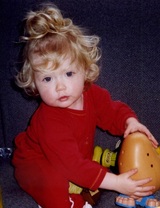
Sophie was two today, I saw her before work
In her pink pyjamas, blonde curls and charming smile
Greeting me then turning to her brand new Noddy house
With car, garage, Tessie Bear, Big Ears, the whole
Gang, opening the red roof to see who was there,
Picking up Noddy and setting him in a chair. This shining child!
Who cannot joy at the sight of a luminous child
Going about the busyness of her world’s work,
Her whole being present to what is set before her there?
Playing with her toys, each limb a part of an integrated whole,
The soft breathing and humming filling the corners of the house
The observing eye connecting to a burgeoning smile.
A storm of passionate tears may turn instantly into a dazzling smile
On the soft, mobile landscape, the face of a human child;
The soul flows effortlessly through the rooms of her father’s house
The child’s consciousness of her self not yet different from the sacred whole
No limits to her explorations, sometimes here, sometimes there,
No lines drawn yet between the worlds of play and work.
Papa va à boulot! Joris is off to work,
Through the window Sophie sends a wave and a vivid smile
Alfie places his elegant paws on the window-sill there
His black and white tail curled round his sleek tortoise-shell whole
The steamed-up panes of their Southborough house
Dampening the palms of the family’s first child.
Smooth wooden floor meets the feet of this running child
Red rug then blue sofa, a path of patch work
Leading her pink toes through the winter house
Breakfast at the round table, porridge of whole
Oats, a milk moat around the sugary island there
She lifts a silvery spoon to her Goldilocks smile.
What brings a wintry frown to the summer of her smile,
This loved infanta, enfant, this Spanish, French and English child?
The absence of her mother, who was always there
And now must sometimes separate from the whole
But, as night falls, returns with all to love’s warm house
As all must play, must rest, must work.
In truth, in faith, in light of God’s unfailing smile
Each child, in each house, whether fractured or whole,
As it grows, may one day see what it knew first: that we come to do, with love, his work.
Scala
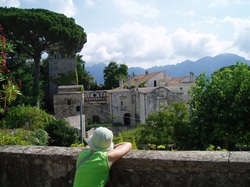
Maroons shatter the air in the ravine, bells ring
as San Lorenzo receives kisses, nestled in shiny red lilies
families file in through the high doors,
hand money to those tallying at the long table.
I Pescatori di Perle sounds from trumpets and timpani,
the band in white shirts and black trousers
marches beneath plane trees.
Old men stand in knots on the streets, jumpers
round shoulders, hands short and square;
in Monastero Largo farmers sit on stone walls
left damp by the thunderstorm.
Stalls with striped awnings stand piled with torrone,
chickpeas, melon seeds; a policeman
holds out his hand as he passes,
shovel of nuts poured into his palm
and he walks on, smiling and eating.
Women call greetings - Carissimi! -
clutch flat packets of cake in pink paper,
young lovers eat calf’s head with a squeeze
of lemon, boys eye tiny birds and terrapins,
provoke lap dogs on leads.
At the end of the evening strolling back
to Z’intonio, a youth spits as we pass.
Holiday at Erddig
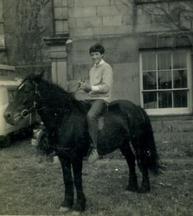
My father’s old friend showed us the Red Room
overlooking Maes Goch for Johnny, and the Blue Bedroom
across the gas-lit passageway for me, with windows
onto the tangled gardens where his pet sheep grazed,
and for ten minutes explained the intricate workings of
the man-trap under the bed: I would be quite safe,
he chuckled, but I demurred, I would sleep with my brother.
We took Roddy and Major out, galloping them
across the Maes and through the woods, sat round
campfires with the Sea-Scouts, played the organ
in the front-parlour under Judge Jefferies’ beady eye
while Phil bowed the saw (Johnny playing, I pumping,
then vice versa), listened to Caruso on wax drums,
ate lettuce and orange salads with Hoo-Ha,
brawn in the agent’s office, cucumber sandwiches
under the wheel of Wilkinson swords in the butler’s
hall, tiptoed at night past the home-made alarm
on the half-landing, clambered mornings over
ancient motorbikes, carriages under tarpaulins,
rode penny-farthings, watched Phil smoking out hornets,
buying tyres at the auction for his black Beetle,
explored attics, stables, chapel, thunder-boxes,
stroked old Bob and peered in glass-cases at
assegais from Africa, delicate bird skulls, shells,
cannon-balls, black feather boas, ostrich eggs,
Samurai helmets, read the framed poems
up the back stairs by sepia portraits of
gardeners, carpenters, maids and chauffeurs,
children in goat-carts, on small fat ponies, and
the black coach boy in his gold-buttoned coat.
On the way back to London, hours on the motorway,
increasingly desperate till we stopped
briefly for a passenger to alight, and my brother
took my hand and we leapt off the bus, Johnny
beseeching a shopkeeper to let me use his toilet and,
when he refused, leading me to a back yard where
I crouched, weeping with relief.
At morning prayers we sit cross-legged
beside her black-bunned Mrs Smith
fierce, upright, a bamboo spear:
One of you has written something filthy in the upstairs lavatory
No-one will leave the Hall until that person owns up.
Silence.
No hand goes up; I can’t be sure, I’m questioning my guilt
but pressure’s building, a red balloon beats against my ribs
the urge to confess overwhelming until
out of my mouth come the words It was me.
All heads turn. Miss White, pinkly flustered, is ordered
to take me to the kitchen, wash out my mouth with soap
and gently leads me through the bacon-scented passage
where, bursting into tears I sob But Miss,
I only wrote I Love Maxie, and am saved, for what
she knows, I don’t.
Thin
Thin
A priest of the Verona Fathers holds the hand of a starving Karamojong boy
Across the plump pink palm and strong fingers of a market gardener lie
the delicate bones of a tiny black bird, the flesh wizened
like fruit dried in the sun, all the moisture gone out of it
a real-life Hansel, too weak now to proffer a twig for the witch to feel
clasped between thumb and forefinger like a trusting new bride
The skeletal shoulder of a Gaultier model protrudes from blue silk
white veil, halo and pierced red heart of a saint, while
children hourly starve to death and we turn blind eyes to the worship of thin
Mothers weep as their daughters hate food, love sugar, binge, vomit on bony bent knees
We call names at fat-boys, bean-poles, wide-loads, all those of us too skinny or too fat
Spain tells its shops to fatten up mannequins, but UK says no, anorexia’s such an elegant disease
Aachen at Advent
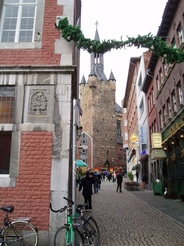
Wardens at the bronze door allowed me in, having
confirmed I came to pray, not see the Emperor’s gold.
Sitting on the crowded pew beneath the dome,
my bladder protested in that cold it would not last through Mass.
I turned to my neighbour, a plain straight faced German,
and asked directions. Instead, getting to her feet
and disdaining her crutch propped against the wall nearby
she grasped my wrist, pulled me the length of the aisle
lumbering from side to side with some difficulty but no complaint
waited for me and, we hurrying back just in time,
picked up our hymn books, the young men solemn
processing past with ceremonial swords,
and sang together the familiar tunes of childhood,
praises to a loving God shared through a century and more
echoed by Tommies and Fritzes on entrenched battlefields
where, interrupted by death and leave, occasional laughter
(Gott Mit Uns, We got mittens too), they sang their songs
and spoke our Lord's Prayer in our separate tongues.
In the street I watched the smiling hurdy-gurdy man,
his hand strapped to the turning handle,
and the riders in a row, they and their
gentle patient mounts black caped and capped
the Rathaus backdropped high behind the Christmas stalls.
Footnote:
The Pfalz in Aachen was the location of the most important
pilgrimage north of the Alps in the Middle Ages, and the site of Charlemagne's
tomb.
Crime & Punishment
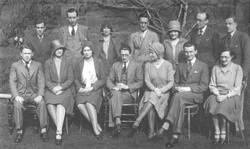
You introduced me to the stage-door keeper, as you always did,
And the wardrobe-mistress, and showed me your dressing-room
With a strip of foam rubber under your costume rail where you took your nap
Between shows.
You’d had a marvellous review in the Times that morning, saying that
Your Marmeladov walked living and entire from the pages of Dostoyevsky,
And though you said it was a bit embarrassing, as you only had a cameo,
You were clearly delighted, and had made several photocopies.
Later, when I watched the play, I enjoyed seeing you die on stage,
Knowing that as the other players carried you off, you were trying your best
To make them laugh, pulling silly faces the audience couldn’t see.
We went back to your digs, the landlady a handsome brunette, (her son
Away at Bedales) a leading light of the local amdrams. You made me a
Late supper, frying sausages hard, burnt on the outside and raw inside,
And fried eggs with ice in the yolks where you’d kept them in the fridge door.
We came home by coach, and the driver checked our tickets. I know who you are!
He exclaimed, You’re Mr Kipling, aren’t you? Heads turned all around as
People craned to see. Yes, you said a little wearily, but you know,
I have done a few other things in my fifty-two years in the business…
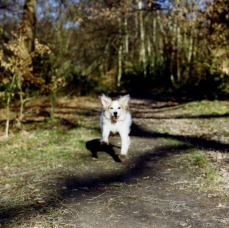
Bob was our family dog (click on picture to enlarge). He provided us with hours of pleasure and much mirth. He was a loyal member of our family and has been much missed since his passing. He was a great character with strangely human neurotic traits. We got him from the dogs' home at the age of three after he'd been rescued from a very bad early life. We had him until he was over sixteen.
Bob’s Been Done
Bob’s had them off at last,
we’ve been meaning to do it for years, but
what with one thing and another,
not got round to it.
We felt pretty bad when we picked him up from the vet,
who roused my anger with his off-hand comment,
as Bob barked loudly on leaving,
That must be hard to live with.
He’s a rescue-dog, I replied indignantly,
thinking bloody Aussie vet,
You’d be like that if you’d been
tied up in a shed for years.
It was only our Tom’s embarrassed presence
that stopped me from adding:
And how’d you feel if
you’d just had your testicles off?
Anyhow, we needn’t have felt guilty,
Bob hasn’t turned into a meek and mild eunuch dog.
In fact it’s the opposite, he’s cheekier if anything:
barks louder at large dogs on leads, gets lippier if he
doesn’t get his walk on time. And this afternoon
when I leaned over the garden fence to talk to Becca,
who was cutting back her borage, there were suddenly
two dogs in her garden, not one. Blinking Bob
had shot through the gap in the fence
to say hello to his lady sheepdog friend.
The Scallywag!
